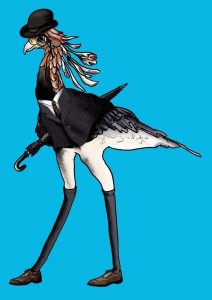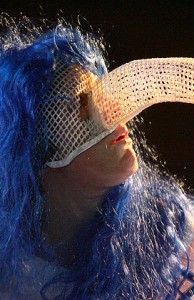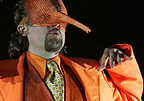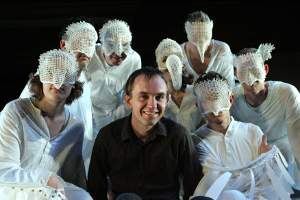Photo: Alistair Muir
The Birds
An opera based on Aristophanes’ fantastical comedy The Birds
A collaboration between I Fagiolini and The Opera Group
Composer – Ed Hughes
Librettist – Glyn Maxwell
Director – John Fulljames
Music Director – Robert Hollingworth
Designer – Soutra Gilmour
Commissioned by the City of London Festival
A man wants to escape the authoritarian laws and continual litigation of the city and so goes to live with the birds. Shortly after arriving, he realises that the birds have enormous potential for growth, so advises them to develop their homeland and put in place all the warring, legal and financial structures he abhorred in Athens.
He persuades the birds to build a city in the sky, cutting off the supply of food and gifts from the humans beneath to the gods above. The plan works and the birds displace the gods as the world’s powerbrokers; the visitor is appointed President of the new city amidst legalistic ceremony.
I Fagiolini creates the primordial world of the birds that is transformed by the arrival of the human outsider, who is played by an actor. Ed Hughes’ richly harmonic music contrasts the elemental, pre-language soundworld of the birds with more complex, shimmering harmonies for the visitor. Strongly rhythmic ritual gestures feature in both vocal writing and the percussive continuo group.
An on-stage cast of twelve performers is supported by a continuo group of cello, percussion and electronics.
First half
Clément Janequin – Le Chant des Oyseaulx (1528)
Trad. arr. Ravenscroft – The Three Ravens (1612)
Per Nøgård – D’Monstrantz Vöögeli (1985)
To accompany and set up Edward Dudley Hughes’ new ensemble opera are three classic works for vocal ensemble inspired by birds. Clement Janequin’s text full of double meanings is nicely revealed in the version of ‘Le Chant des Oyseaulx’ for four twitchers and four birds. Ravenscroft’s haunting setting of the allegorical folksong ‘The Three Ravens’ is simple but moving while Per Nøgård’s ‘D’Monstrantz Vöögeli’ is set in a lunatic asylum using the song of the wren, nightingale and thrush in recording and imitation to pay tribute to these birds’ rich and ravishing performance.
Original cast:
Pitcher, the Man – Glenville Hargreaves
Hoopoe – Giles Underwood
Crow – Carys Lane
Hummingbird / Iris – Julie Cooper
Flamingo / Rockstar – Juliette Pochin
Second Pigeon – Clare Wilkinson
Hawk – Richard Wyn Roberts
Cuckoo / Guru – Robert Hollingworth
Owl – Simon Wall
Vulture / Herakles – Robert Rice
First Pigeon / PR guy – Paul Reeves
Cello – Michael Atkinson
Percussion – Tim Palmer
Electronics – Ed Hughes and Emma Williams
Glyn Maxwell and Ed Hughes in conversation with John Fulljames about The Birds (2005)
JOHN: How closely have you followed Aristophanes’ 2,500-year-old play?
GLYN: It had to be a new piece simply in terms of length – the text of the play is at least ten times the size. I suppose I tried to imagine how Aristophanes would write what I was being asked to write – a libretto in London in 2005. Now I think he would probably write for Private Eye, so it’s topical, full of bad puns and a bit childish, but at heart dead serious about the life we lead here. All good comedy gives a damn. I would hope people find it a bit coarse and a bit silly, I’m sure they thought the original was. After all, it only came second in the festival.
JOHN: Why did we decide to make Pitcher an actor?
GLYN: Well, it’s transposing the awe we feel when we see birds fly to the awe people like me feel when we hear singers sing. Seeing or hearing the body used beyond our reach. Pitcher is earthbound. He’s a ‘pitcher’ – a vessel stuck on the earth and a man tossing out ideas.
ED: Do you write differently as a poet if the work is to be performed as opposed to read? Or is sound always important in your work?
GLYN: Sound is always vital, but in poetry it shoulders everything. Here I’m making sprung little lines for Ed to work into or across the music. You can’t wire in subtle metrics or sound-echoes, because the music will either not need them or replicate them in its own space. You want clarity, concision, repetition, and a certain thematic coherence.
JOHN: How do specific sounds of the city enter the piece?
ED: A theme that we can clearly understand today is the contrast between countryside peace and quiet, and city sounds. I thought back to early twentieth century evocations of mechanised and urban city life (e.g. percussion works of Var̬se, and the films Metropolis and Sunrise) and thought it would be great if we could use electronics and percussion to create something of this atmosphere, of being on the edge of a great city, with its colours and sounds, and its negative things as well Рnotably the things that Pitcher is fed up with; the chaos, the perpetual hustle and bustle, and so on.
JOHN: And what about birds?
GLYN: I listened to bird-songs (on the internet, obviously, to be true to the theme of spiralling ‘civilisation’) and tried to give specific birds their appropriate vowels and fricatives. Owls rhyme ‘oo’, that sort of thing. Not quite that unsubtle, but nearly. For poets, bird-song is a metaphor too close for comfort, because if we’re remembered at all it’ll be by voice alone, by the little song we made, and probably on the internet.
ED: I listen to birds on walks and appreciate the fact that they are communicating, and at the same time listening very hard (unlike humans perhaps), and I’ve taken in something of the repetitive rhythmic patterns they use. But I’m not an expert.
GLYN: Did working with I Fagiolini present specific challenges or benefits?
ED: Yes, I’d written for them before and love the integrity and musicianship which they bring to new music and the energy with which they reinvigorate historic forms such as the madrigal comedy. They have a special sense of ensemble.
JOHN: I spend a lot of time in the rehearsal room trying to form an ensemble – I thought it would be an interesting experiment to work with an existing vocal ensemble – a group of singers who already have close musical relationships and a shared language and process. The chance to plan a new piece – in part responding to specific singers and their roles within the ensemble is unique. Aristophanes’ comedies are totally focussed on the chorus – they are the protagonist – and so ideal for an ensemble focussed piece. Does anyone remember what else attracted us to The Birds in the first place?
GLYN: Any story that’s lasted that long just makes me kneel in awe. And to last that long with all those filthy in-jokes – well, one is prostrate with respect.
Composer Ed Hughes has recently completed a major commission from the Brighton Festival – a new score to Sergei Eisenstein’s classic silent film Battleship Potemkin. These and other works have toured to the Salamanca Festival (2005) and to the Sydney Festival (2005) in the Sydney Opera House. Memory of Colour was subsequently shortlisted for a British Composer Award. He was commissioned by Glyndebourne Opera and Photoworks to write a new orchestral score to the Sophy Rickett film (commissioned simultaneously) about Glyndebourne entitled ‘AUDITORIUM‘. The joint work premiered live at Glyndebourne on 17 November 2007 and was installed at the De La Warr Pavilion, Bexhill, prior to an international tour. AUDITORIUM was shortlisted for a British Composer Award in 2008. Ed’s opera Cocteau in the Underworld, with a libretto by Roger Morris, is currently in development with the Royal Opera House Opera Genesis programme; extracts were performed at the Brighton Festival in 2009. His work continues to be widely performed and broadcast. www.edhughes.org.uk
Librettist Glyn Maxwell studied at Oxford and Boston Universities and is widely published as an award-winning poet, novelist, dramatist and librettist. Recent theatre work includes The Lifeblood: A play of Mary Queen of Scots, Edinburgh Festival 2004, The Last Valentine, Almeida Theatre 2002, Broken Journey, Hen and Chickens 2002, and Girl of Sand and Ariadne for Almeida Opera. www.glynmaxwell.com
John Fulljames (director)
For The Opera Group where he is Artistic Director: Into the Little Hill, Street Scene, Judith Weir’s Blond Eckbert, Shostakovich’s The Nose and the world premieres of Julian Phillips’s Varjak Paw, Edward Rushton’s The Shops, Ed Hughes’s The Birds and the original production of The Enchanted Pig. Other recent productions include The Excursions of Mr BrouÄek, Roméo et Juliette, Saul and Hansel and Gretel (Opera North), Gianni Schicchi, Florentine Tragedy and Mavra (Greek National Opera), Snegurochka and Susannah (Wexford Festival, winner, Irish Theatre Awards Best Opera Production), Tobias and the Angel (Young Vic/ETO) and Nabucco (Opera Holland Park).
- I was thinking that. Also @JolyonMaugham was (which carries a little more weight). https://t.co/pAu9emYdGd
- For my birthday I have done admin, walked dog, and rehearsed Walton with @The24choir https://t.co/jNTU2B3UIw https://t.co/LDhso8U9jS
- It's very reasonably priced and all those benefits.... https://t.co/DFJS8e9Dqw




